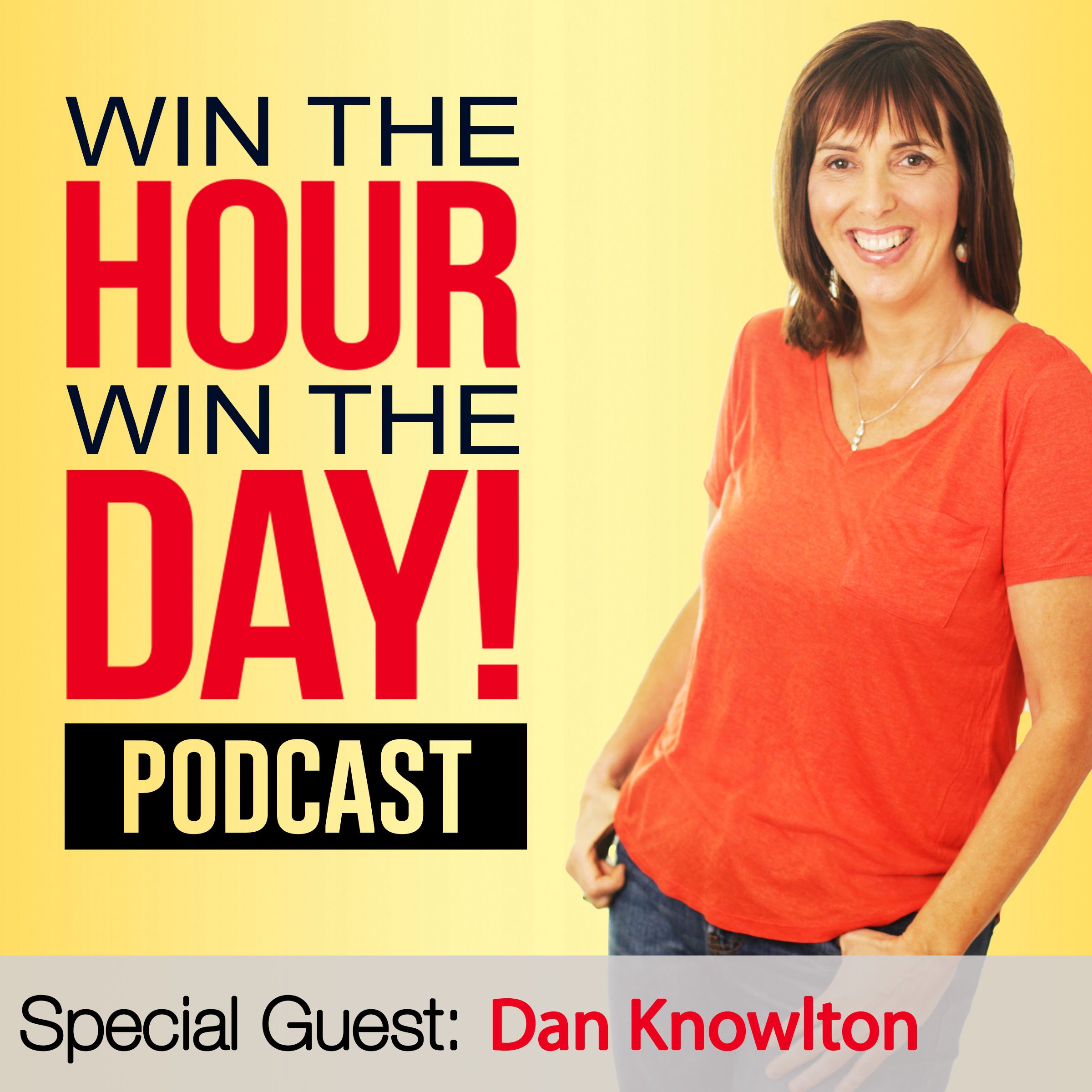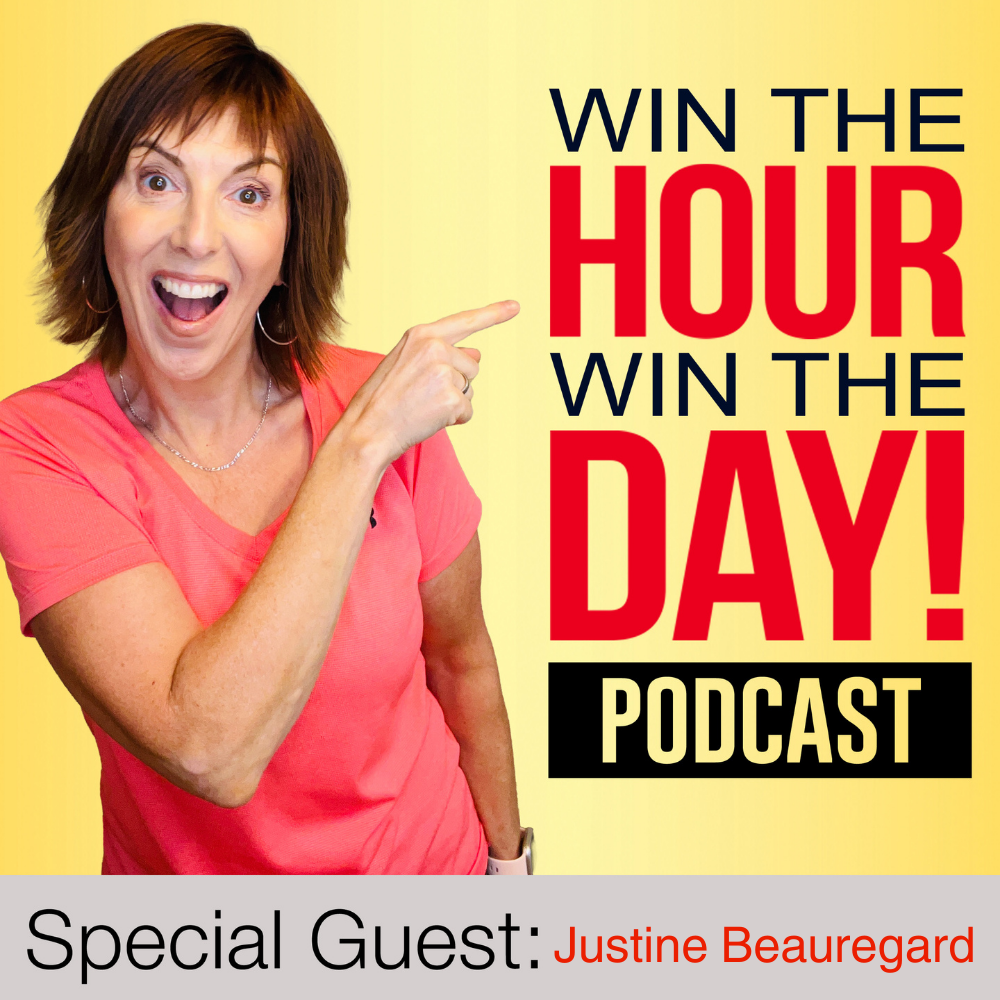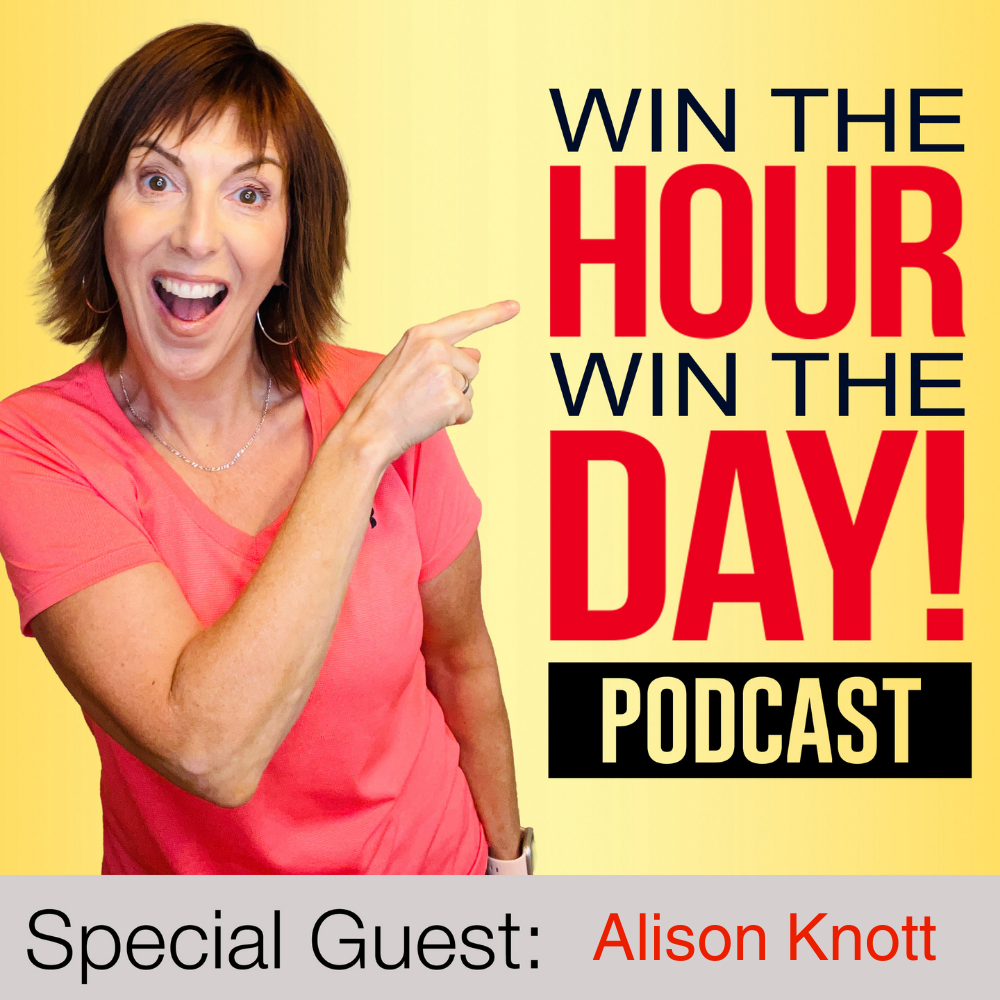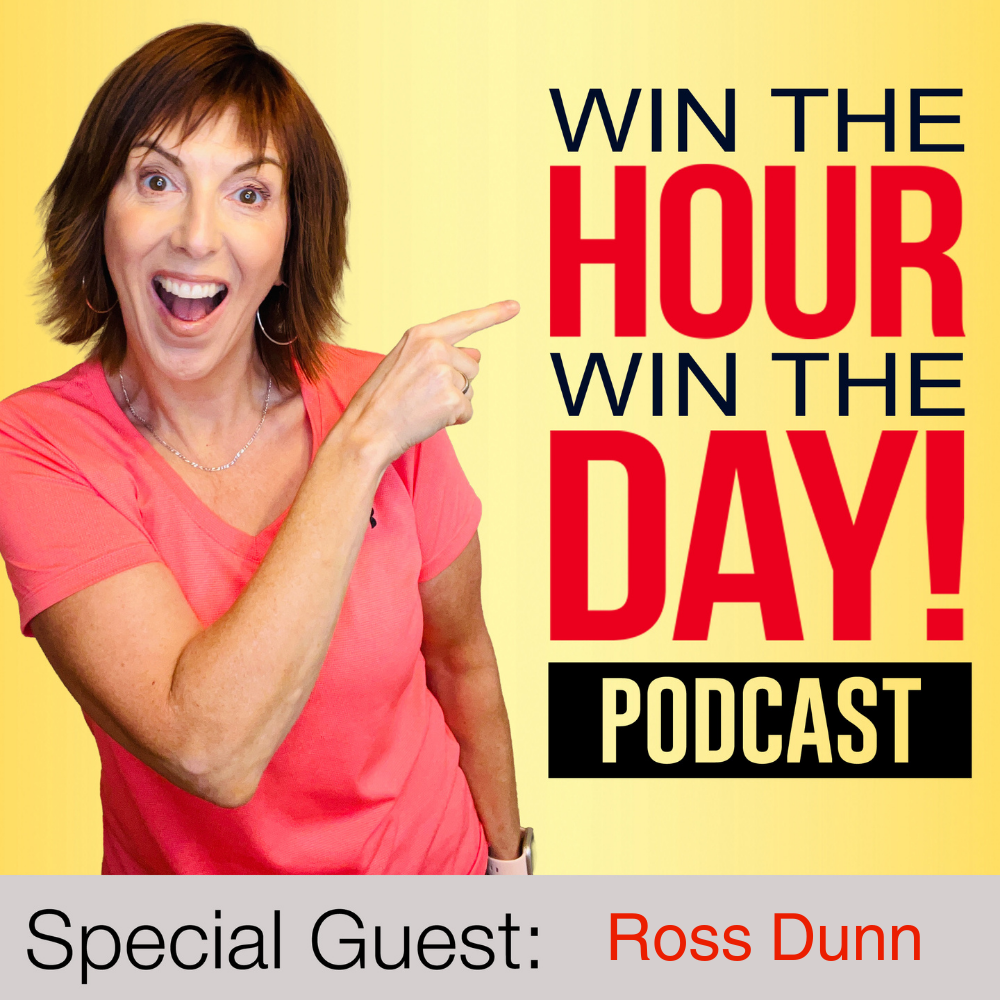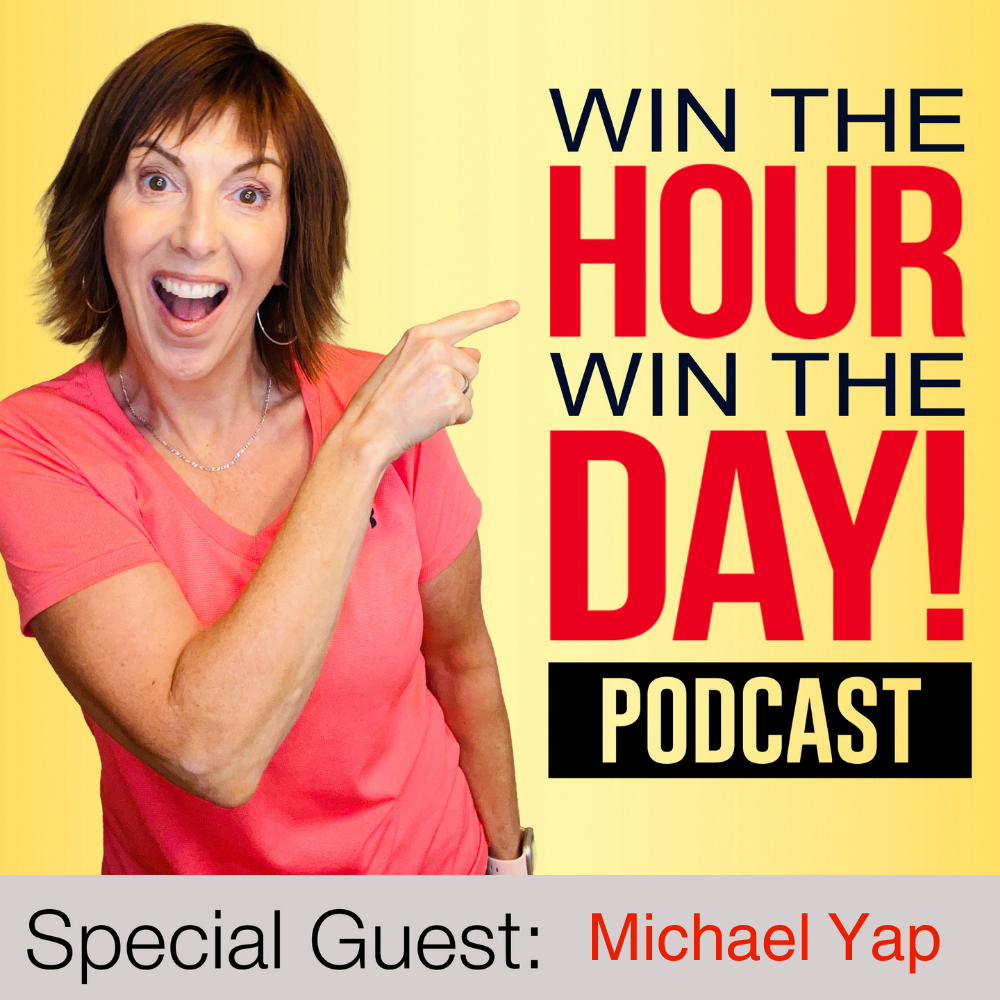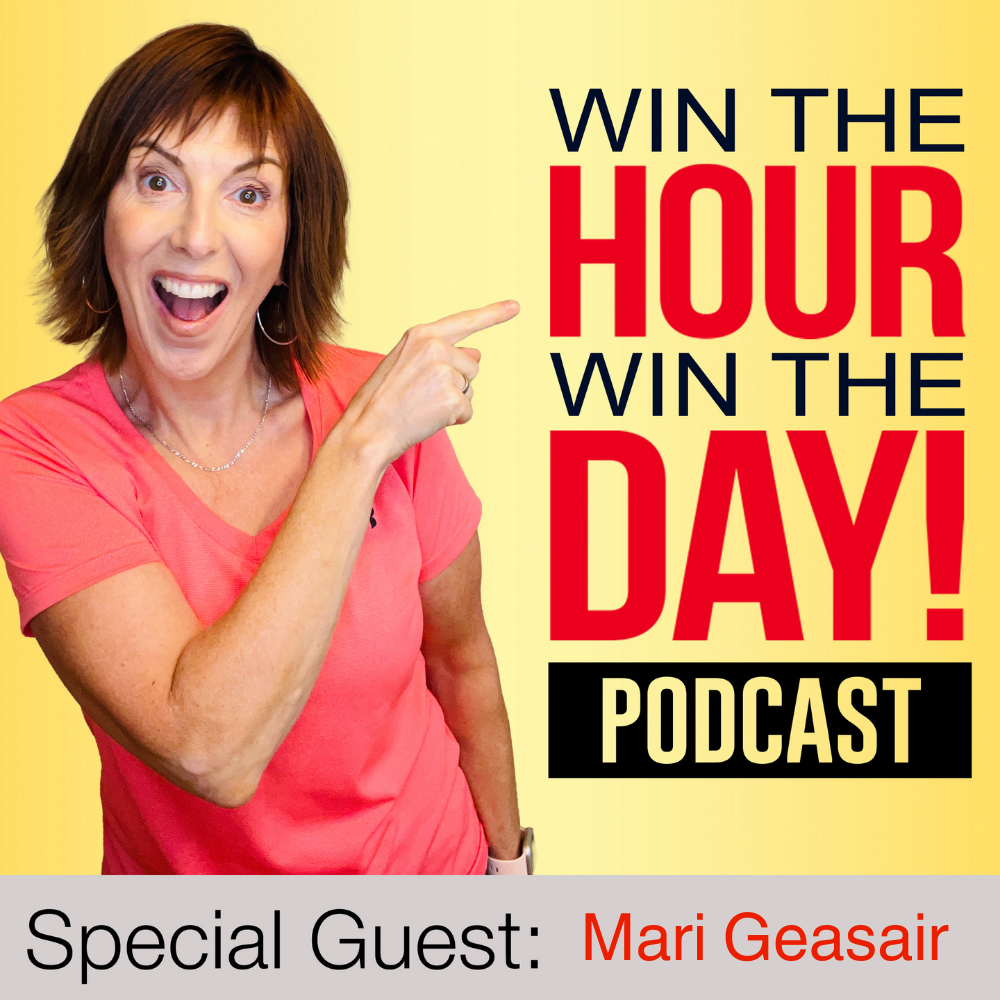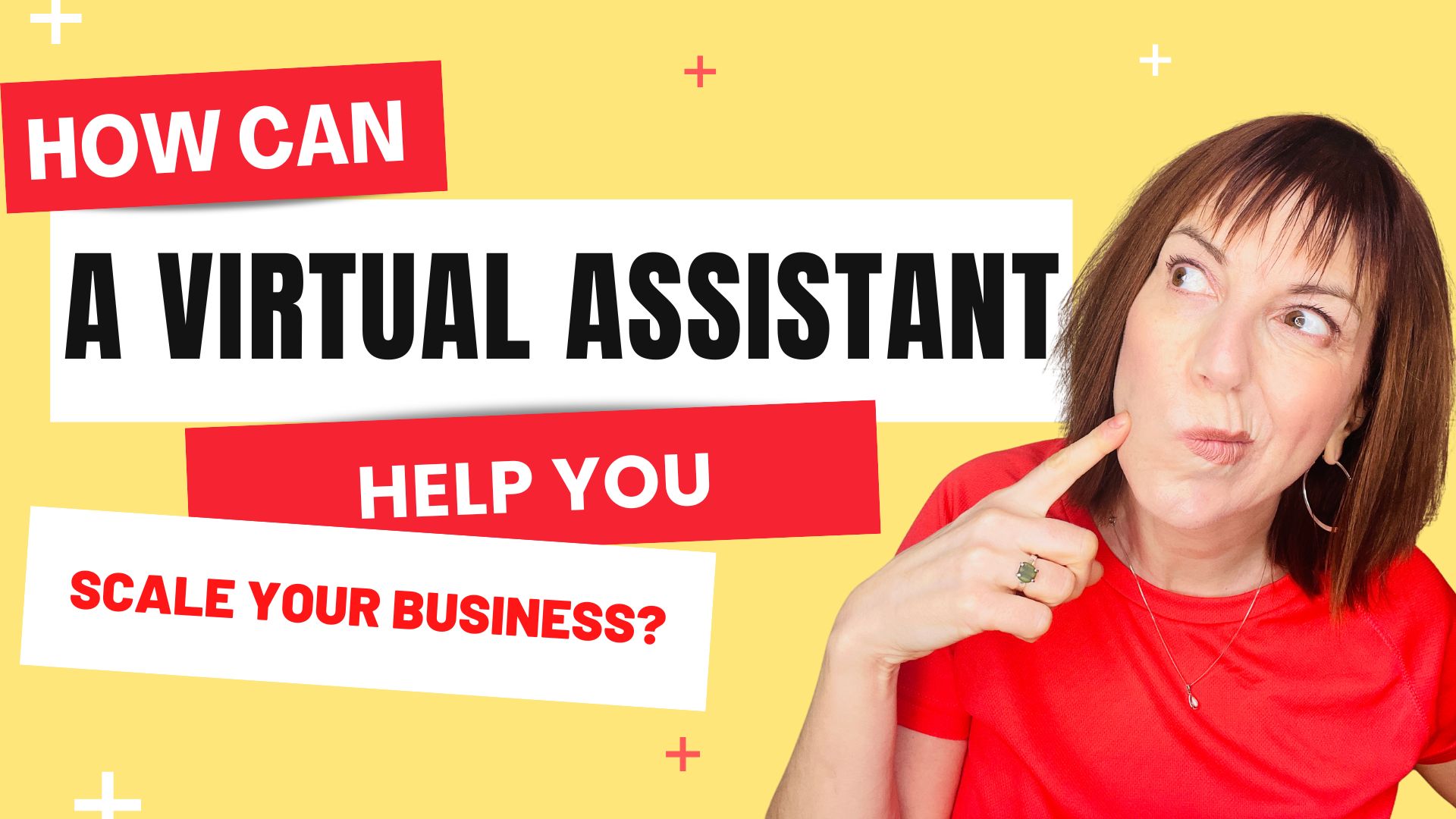Episode Summary
Dan Knowlton is a brilliant marketer. This week he shares the biggest secrets of Twitter. Yes, Twitter! Probably the most underused and forgotten of all the social media platforms. I was shocked at how much I could do for my business on Twitter.
Tune in and have “aha” moments with me. It’s a great show full of huge value bombs!
Learn how:
-tap into current events with your audience.
-connect in real time and reach people you normally couldn’t.
-leverage what is happening right now with your audience!
Join The Community: https://www.facebook.com/groups/WinTheHourWinTheDay/
Win The Hour, Win The Day! www.winthehourwintheday.com
Podcast: Win The Hour, Win The Day Podcast
Facebook: https://www.facebook.com/winthehourwintheday/
LinkedIn: https://www.linkedin.com/company/win-the-hour-win-the-day-podcast
You can find Dan Knowlton at:
Email Address: dan@knowltonmarketing.co.uk
LinkedIn: https://www.linkedin.com/in/danielknowlton1/
Company Website: https://www.knowltonmarketing.co.uk
Blog: https://www.knowltonmarketing.co.uk/blog/
Podcast: bit.ly/businessanchorspodcast
Twitter (Business): https://twitter.com/KnowltonTeam
Twitter (Personal): https://twitter.com/dknowlton1
Check out the Outsourcing Playbook For Busy Entrepreneurs here: https://winthehourwintheday.com/outsourcing-playbook
Dan Knowlton Transcription
[00:01:58] Hey everyone. It’s Chris ward from when the hour, when the day and I am the real today, I’m very excited. I’m going to be chatty Cathy today. We have Dan Knowlton in the house and he is a UK, UK based digital and social media marketing expert who has grown no 10. Formerly K P S digital marketing into a multi award winning business that has worked with the likes of FIFA and Nestle Citibank Euro tunnel and Boston consulting group.
[00:02:30] In addition to running Knowlton, Dan is now known for giving his best insights all around the world on stages, and I can totally attest to that. I saw him and he was awesome. Now, Dan, welcome to the
[00:02:44] Dan Knowlton: [00:02:44] show. Thank you. Thanks for having me. What an intro.
[00:02:48] Kris Ward: [00:02:48] Well, you know what? I’m just so excited. Uh, I feel like a little child when Dan hopped on the call to get going with us, I was like, Oh, I have to tell you all the amazing things I have when I saw you on stage.
[00:02:58] You were awesome. When I saw you on stage, Dan, you were particularly charming and smart, but you were focusing on Twitter. And I thought that’s one of the platforms that I think is really misunderstood. And I know, I think I use it wrong. So I thought you could sort of enlighten us and get us sort of, you know, using that more to our advantage.
[00:03:18] So what do you think about that?
[00:03:20] Dan Knowlton: [00:03:20] Yeah, I think, um, the big question that everyone has is why are you using the platform? And it’s, so it’s so important to understand that cause you know, you don’t just want to jump on Twitter and think, Oh, I’m gonna tweet. And hopefully it will help me achieve X. You really need to understand, you know, what can Twitter do for you?
[00:03:38] And. Why would you consider using it and then start to come up with a plan for how you can actually use it because it can help you achieve loads of different things depending on how you use it.
[00:03:49] Kris Ward: [00:03:49] Yeah. So for me, my basic understanding of it is two things. One, I find it really a resource for, Hey, here’s my will been canceled or what’s happening on this one.
[00:03:59] Like, you know, access to things that are really in my personal world, kind of fluffy. And the other thing I saw it in, in the past, I would say. Seed is things like if I had a food truck and my location was going to be changing every day and I really, other than just throwing blitz of information out there for no purpose, other than that, I’m just copying and pasting from another platform.
[00:04:20] That’s what I was using Twitter for. And I’m sure I’m not the only one doing a poor job of it. So why don’t you tell us, you know, sort of, how did you stumble into using it effectively or, or really where do we start?
[00:04:32] Dan Knowlton: [00:04:32] Yeah. So I guess I remember the year I joined Twitter, Twitter was the first platform that I signed up for and actually started using for our agency.
[00:04:41] Um, we’ve since sort of evolved and we use a whole range of platforms now, but Twitter, the thing about Twitter is Twitter is where people go to share ideas and information instantly. It’s where it’s where things are happening in the world right now. You know, there there’s famous presidents that are using it.
[00:05:03] Kris Ward: [00:05:03] We’re both safe because you’re from England and I’m from Canada. So that was very nonjudgmental. He said there’s
[00:05:11] Dan Knowlton: [00:05:11] an exact
[00:05:12] Kris Ward: [00:05:12] write that down. So you were very kind there, so, okay. There were some presidents currently in the world in other countries that are using it
[00:05:20] Dan Knowlton: [00:05:20] to basically say what’s on their mind. Um, but yeah, it’s, it’s a place where people go to consume breaking industry news to, um, to speak to difficult, to reach people.
[00:05:34] So if you think about compare it to other social platforms is very. I’m open. So if, you know, if you reach out to someone on Twitter, it’s open for the world to see, and if they don’t respond to you, you know, they kind of feel a pressure to respond to you. So it’s, it’s a place where you can go to, to speak to difficult, to reach people, customer service.
[00:05:52] If you think when you’ve got a problem with a company, now you don’t call up their customer service line, you tweet them. Um, so there’s all these different ways that Twitter is used. And I guess from a marketing perspective, we need to be thinking. You know, how can we use Twitter in a way that’s mapped to why our potential customers are using it.
[00:06:12] Right. Right. You know, they’re not going to Twitter to see an ad from you trying to sell your products or service in their face. They’re potentially going there. Because they’ve got a customer service issue with their potentially going there because they’re at your events and they want to engage with other people from that event around a hashtag.
[00:06:29] So yeah. So important to actually get an understanding of why are you using these platforms and how you’re going to use them based on how your customer is using first of all?
[00:06:38] Kris Ward: [00:06:38] Yeah, I think that’s such a valuable reminder. We, you know it and you hear it. And then, you know it and you have to hear it again because you get into this like, okay, whatever the flavor of the month, this week is pro platform.
[00:06:50] A and then you think, okay, I’ll focus on a cause that’s the new thing, which is, you know, reactive and silly. And then, and I’m speaking for myself, not judging anyone else, myself. And then you go, okay, well, I guess what, I’ll do a little, just copy and paste what I put on a, to B and C. Cause I have it anyhow.
[00:07:05] And I guess it’s like showing up to different aspects of your life. Like maybe this is w outfit I wore to the gym, but I shouldn’t go to church in it kind of thing.
[00:07:12] Dan Knowlton: [00:07:12] Right. Yeah, exactly. And like, I’ve kind of said in the talk Twitter, isn’t the answer to all of your problems. You know, we’re speaking about Twitter now, Twitter is just one tool in your marketing toolkit.
[00:07:25] You know, I’m not sitting here saying stop going on all your other social channels and utilizing those, just use Twitter because it’s the best platform out there. No I’m saying, understand the power of Twitter and what it can be useful. And then think about, could you utilize that as of your toolkit, could you be utilizing as a customer service platform?
[00:07:45] Could you be utilizing as a platform to engage people who are at your live events? You know, so
[00:07:50] Kris Ward: [00:07:50] yeah. So for the regular entrepreneur service-based binge industry, and you’ve got some coaching clients. Do you see Twitter is having, you know, a purpose for us?
[00:08:03] Dan Knowlton: [00:08:03] Yeah. I mean, the way I find Twitter really works for us is as a customer insights tool.
[00:08:10] So Twitter is the largest sort of open resource to find out what people care about because that’s where they go to share their opinions. So through Twitter search and the Twitter advanced search, you can, you can input certain criteria to find tweets. It’s been fine opinions of the people you want to reach are having on certain topics so that you can start to understand whom if my target audience are talking a lot about American football and they’ve got this opinion and you, you run like a baseball card shop, you could start to shape your content around the opinions they’re having.
[00:08:42] Cause you know, that will, that will resonate with that. So we, we really find it works brilliantly as a sort of a customer insights tool.
[00:08:50] Kris Ward: [00:08:50] Oh, that is, that is really awesome. Okay. So in the other platforms we get so caught up in, you know, hashtags and all these things, and then you’re like, okay, which is the hashtag and how do I find in what ranked and how many numbers and there’s all the signs to it.
[00:09:04] So what you’re saying is with Twitter, you can just go in and see what the trending topics. And there’s going to be clear positions on those trending topics. And that’s going to equip you to put information out, not only maybe on Twitter, but even on am I stretching it on other platforms, educate you as well.
[00:09:22] Dan Knowlton: [00:09:22] Yeah, you’re exactly right. And again, this is just one way that we found through to work pretty well, but we, we we’ve run campaigns for clients where. We’ve utilized the platform as a customer insights tool to help shape the strategy for a Facebook ads campaign. So for example, we’ve worked with this UK-based Apple brand, literally like the Apple that you eat.
[00:09:42] And we produce these whole creative campaigns on Facebook with Facebook ads, integrating their brand with popular TV shows that their customers watch. And one of those popular TV shows was a dancing show called dancy on ice. So what we did was we looked at Twitter and utilize that as a customer insights tool to learn what were people saying about the show in the moment?
[00:10:04] And we shaped our content tapping into those opinions. So it’s a sure fire way to create content that you know, your customers care about because you’re literally sharing the opinions that that most people are having, because you’ve done the research to find out. So, yeah. Oh,
[00:10:19] Kris Ward: [00:10:19] I see. I see in England, that’s brilliant.
[00:10:23] Dan Knowlton: [00:10:23] It’s really cool. And there’s loads of applications for this. Like, I’d be, if you’re listening and, you know, whatever type of business you have tried to try to search. Um, TV shows, topics, keywords, the people that your customers care about to see the opinions they have on those certain things so that you can start to cause you know, no one cares about your product or service.
[00:10:44] They care about their interests. So if you can integrate your brand with one of their interests in a creative way and start to start to share similar opinions and tap into the opinions, you know, they have, that’s going to help you resonate with them and help them engage with you.
[00:11:00] Kris Ward: [00:11:00] That is really helpful.
[00:11:01] And I really love that this is what my show is all about. I always want it to be something you can do now, change a concept, move quickly because so many things you just inundated with knowledge and content and what I find it’s really easy to always be pulled further, further away from the goal like, Oh, I’m going to do this.
[00:11:17] Oh, well then you have to learn this before you do this before you do that. Right. So what I love about this is, Hey, look, just go to the trending topics, take a look. And it’s something that can really. Change you really, what you’re doing is throwing yourself in a room full of people that have opinions, you know, that will, that will benefit you.
[00:11:35] Right?
[00:11:35] Dan Knowlton: [00:11:35] Exactly. Yeah. And then there’s just, there’s so many other cool ways you can, you can use to that game. We’ve, we’ve kind of gone into one specific direction. We’re here to listen. So another. Another way to utilize Twitter as a company, as an organization or as a, as a personal brand is to utilize, um, social listening, to see what people are saying either about you or your brand, um, or around your, the type of business you are.
[00:12:02] So for example, you can use, um, social listening tools to, uh, alert you when anyone is mentioning San Diego and hotel. Uh, in a tweet and you can find people who are saying good and bad things about local hotels in San Diego. So if you run a local accommodation in San Diego, you could reach out to these people and say, Hey, we noticed that you’ve upset.
[00:12:28] What, by your recent experience at X hotel, why don’t you try us out? Or if you’re a bigger organization like Starbucks or, um, you know, any other big organization that people mentioned, your actual organization name, you can utilizing it to find people who were saying, Oh, I love Starbucks or, Oh, I had a bad experience in Starbucks and you can then respond to them and start to engage with them and build that trust or overcome, um, any negative feedback that you may have actually identify that and then deal with it.
[00:12:56] Okay.
[00:12:57] Kris Ward: [00:12:57] That’s an awesome tip. So social listing tool. Now, my experience has been with that. They’re the ones that I learned of were connected to platforms where they would output like on, um, whatever, take my post and put it on a social media management. So I’m going to put my post on LinkedIn, Facebook, whatever.
[00:13:12] And in that they had a social listening tool as well. And I don’t know, but, you know, cause everything’s constantly changing and everything is all like, this is what they say and who’s they, and it keeps rotating. The information I had received lately is the social media platforms where you output your posts is that they don’t rank as well as if you manually or organically put them on the individual posts.
[00:13:37] So then are there, if that’s true, are there social media or social listening tools in an itself or are they all connected to the social media management?
[00:13:46] Dan Knowlton: [00:13:46] Yeah, so a couple of things, um, I I’ve, I’ve never actually done an experiment to see if using social scheduling tools has a positive or negative impact.
[00:13:54] However, we don’t use any because most of the campaigns we run are on, uh, kind of platforms like Facebook and Facebook ads. And we utilize that their internal scheduling tool because it’s got, gives us all the capabilities to schedule ads and things that works really well. Secondly, yes, there are separate social listening tools.
[00:14:13] So there’s, there’s things like buzz Sumo there’s brands, brands, Wenty four, which are kind of entry, not entry level, but lower cost options. Then if you really want to get into social listening there there’s um, bigger solutions like, um, talk Walker. It has a whole plethora of different, uh, options. There’s social bakers.
[00:14:34] Um, but yeah, there is, there is standalone alone, social. If you listen to it, to be honest, I find BuzzSumo, which probably has less features, but it’s really simple and easy to use. We have that set up for whenever my name or our business name, or we get, um, people linking to our website will notify us so that we can then, um, yeah.
[00:14:55] Reach out to them and see where people are mentioning our name.
[00:14:57] Kris Ward: [00:14:57] I love that. Okay. That’s awesome. I love that another English tweet. Okay. All right. So mr. Wise, Dan, continue just throw your brilliant dog. Cause I don’t even think that I’ll be honest. I don’t think I even know enough. You don’t know what you don’t know.
[00:15:14] So this Twitter thing. It’s on my phone. I pop in there from time to time. Um, you know, I see a few things or I think this is neat, or I follow that. And then I check back next week. So I think really, you know, we’re just at the mercy of your wisdom here. Tell us some other silly things that we don’t know wasting our time, not knowing.
[00:15:32] Dan Knowlton: [00:15:32] Okay. So another, in terms of driving business and conversions, another way you can utilize Twitter to do this is again through Twitter search. So there’s something called Twitter, advanced search. If you Google that, it will take you to a site where you can input certain criteria and the search platform will bring back tweets that meet that criteria.
[00:15:54] So one way you can do this is by identify people who are showing they have intentions to buy products like yours. So for example, if you typed in, um, the keywords to this Twitter, advanced search recommend, uh, social media marketing, UK or recommend social media marketing. Canada. It would bring back all the tweets of people who were saying it or who including recommend social media, marketing Canada in their tweet.
[00:16:24] And what you’ll find is people are, people are constantly looking for guidance on, um, businesses to work with on Twitter. So you can find people who are tweeting saying, Hey, does anyone, can anyone recommend a social media marketing company in Canada? Can anyone recommend a hotel to stay out in Dallas?
[00:16:42] Can anyone recommend. A cleaning company in the UK. And then you can actually identify these people who have a need for your product or service. And then you can reach out to them just another way to gain value from Twitter to really convert business.
[00:16:56] Kris Ward: [00:16:56] So like we’re launching the, uh, outsourcing playbook.
[00:16:59] For busy entrepreneurs, teaching people outsource, grow their team, all that stuff. Right. So then I could be doing that on Twitter because people are constantly asking me, well, where do you go for outsourcing or team building or whatever, like, Oh, which platform is the right platform for outsourcing? And then here they’d have this tool.
[00:17:14] They’ll not answering the question of the platform. I’m giving them a better tool because we know that they’re at that point of the journey
[00:17:20] Dan Knowlton: [00:17:20] and it’s yeah. And it’s, and it’s, it’s just, it’s a soft approach to build awareness for you. So again, With, with these new people that you’re reaching out to, you don’t have to just instantly try and sell your products or service, you can try and help them.
[00:17:35] So they may be saying, how can I outsource or how can I improve my outsourcing? You may have some resources that all blogs, videos, podcasts that you’ve produced, that they could listen to or watch to help answer their questions. So, one example of a way we’ve done. This is. So we, we are sort of partners with a captions tool called rev.com where they automatically produce captions for your videos.
[00:17:59] So one way we use this is we’ve created a whole tutorial, written tutorial and video tutorial showing you how to utilize this tool to add captions and subtitles to your videos. So what we do. On a regular basis. We use social listening tools or Twitter search to find people who are tweeting, asking how they can add subtitles, their videos.
[00:18:19] We’ll then tweet them and say, Hey Susan, we’ve created this handy resource for you to add subtitles to your video. It’s links to our article and video within that there’s affiliate links to the product where we aren’t a commission. Um, every time someone used that product. So again, it’s helping us generate revenue, but it’s a soft approach because we’re not saying, Hey, suddenly pay for this product.
[00:18:42] We’re saying here’s a valuable resource to help answer your questions, soul, your problem. And then in turn, that’s helping us.
[00:18:50] Kris Ward: [00:18:50] Right. And that makes sense. I mean, of course I have lead-generating things in opt-ins and stuff for people to opt in and free training, but then you’re kind of depending where you are pushing that out.
[00:18:59] Whereas what you’re saying is Twitter, you can just go into the arena in which they’re asking that particular question and then generously give it to them. And they’re standing there with open hands.
[00:19:09] Dan Knowlton: [00:19:09] Exactly. Just think we’re as marketers, we’re constantly trying to get drive traffic to our website, get people to become aware of us.
[00:19:16] Yeah, shouting at everyone saying, buy our product, come on our website, go to our website. What we’re saying is, Hey, you’ve just asked a question. You’re looking for an answer to a problem. Here’s the answer on our website or here’s the answer? Here’s the resource for our podcast to show you how to, how to overcome that problem.
[00:19:35] So, yes.
[00:19:35] Kris Ward: [00:19:35] So funny to me, because really, I think Twitter used on inappropriately. It has been criticized is just walking into a room where everyone’s talking at the same time and all this information. And I think, you know, how misinformed we all were because you’re saying, yeah, okay. You can just walk in and you have no purpose and no goal, like being at a party where you’ll just talk to anybody, but anything, you know, what’s the goal.
[00:19:57] So I think you’re really turning this. Upside down. And, and do you feel sometimes, like you’re the only one that understands Twitter or are we just the rest of us are out of this element?
[00:20:07] Dan Knowlton: [00:20:07] No, I think, I think it’s just the way different people are utilizing it. Like, again, a while ago there was a problem with Twitter that it will, and it’s still theirs in terms of it being noisy, people would just.
[00:20:18] Automatically posting links to articles and things, and just sort of spamming the whole platform. So you go on Twitter and it’s just loads of people who have automatically scheduled art articles from their websites, or go on Twitter. And it was a really noisy place. So I think it’s just a case of at one point that strategy worked.
[00:20:35] And people would see articles on switch and think, Oh great. People are linking to articles, but over time, these strategies become obsolete and then they become annoying. And then it’s just a case of constantly evolving and learning around new ways that you can use the platform.
[00:20:49] Kris Ward: [00:20:49] Right. That is it. These are all, sometimes you need the smartest people to tell us if things that we already knew and forgot, because it’s like anything in life where you go, you know what that worked when you were 21 that got you into the game.
[00:21:03] It won’t keep you at the game, right. Or good in that outfit when you’re 19 sweetheart. But
[00:21:08] Dan Knowlton: [00:21:08] not now, it’s hard because you come become kind of attached. If something’s working or has worked in the past, then. You know, it’s difficult to, to, to park that and say, you know what, we’re going to stop doing that.
[00:21:20] And we’ve got to try this new scary thing. No one likes change. Like I spoke about, um, we book on our podcast, the business anchors podcast, which is launching, um, episode tomorrow, which is about the books that we’ve read that have really helped us. And there’s one book called who moved my cheese and it’s yeah.
[00:21:36] So it’s the, it’s like a fable. It’s all about, um, how to overcome change and yeah, it’s like anything when it’s like on the social platforms, when. When Facebook bring out a new design, everyone is kicking and screaming, so I may hate it and it’s horrible. And then they get used to it. And then it’s fine.
[00:21:53] It’s just the classic change curve. Um, yeah, trying to try to innovate and. Yeah,
[00:22:00] Kris Ward: [00:22:00] no, it makes sense. All right. So, you know, what else do we need? Just, these are really good value bombs. So that makes so much sense. So really just come at Twitter from a totally different perspective and stop blasting it and just throwing out content, but really look at it is an opportunity almost like to pre-qualifier or interview your audience.
Dan Knowlton: [00:22:20] Yeah. There’s some ways to use it, but ultimately, the simple way to think about Twitter is right. How do your customers use the platform? What do they use it for? There was, there was some research. I can’t remember. I shared a study in my talk. There was some research that’s been done, um, by a group around why people use Twitter and some of the top answers to that, that research.
[00:22:42] They, they surveyed thousands of Twitter users and it was. The top ones were like to share ideas and information, instant to share, sorry, what they were thinking about. So social to share opinions, right? So people are going there to share opinions and to network with other people to find breaking industry news.
[00:23:00] So if you start to think about the reasons why your audience is utilizing the platform, then you can start to map your strategy around giving them what they want. If they’re going to Twitter to consume the latest breaking industry news. Why don’t you share the breaking industry news on Twitter as part of your content strategy.
[00:23:17] If they’re going there to network, why don’t you start to build some kind of networking, Twitter chat or something where you can start to network with them, you know, map what you’re doing to why they are on the platform. This is the biggest mismatch we see with marketing, marketers and brands just don’t get that.
[00:23:35] Like, for example, other platforms like. Facebook people are going there to, for escapism to consume interesting content. They’re not going there to be sold products or services. So you need to map your strategy around why your customers are actually using the platform. Yeah.
[00:23:50] Kris Ward: [00:23:50] And you know what, you know, the best of the best, I think can know that, you know, with marketing my background as well, which I always feel foolish telling someone like you that, cause I feel like I’m, I don’t know, telling Meryl Streep, I’d like to be an actress, whatever.
[00:24:04] So I’m like, Oh, watch my, my community. But, so I think what happens though, is when there’s so much reshaping and so much change and so much technology constantly changing, right. You know, the now there’s tick-tock, and there’s always these things. So you come into this knowing with your marketing strategy and all your smarts, and then you use this and you’re right.
[00:24:24] And then all of a sudden, whatever, let’s say you’re on Facebook. And then everything changes on Facebook. And so you forget to reevaluate all this stuff, because then you think, Oh, well, you know, Facebook now, that’s not good. Let’s move on to the next thing. LinkedIn is the new shiny thing. So you forget to kind of reevaluate.
[00:24:40] You just kind of start following in a panic reacting with the crowds. And so some of your advice is very simplistic and profound, but I swear you have to be retold that on a regular basis because it’s easy to get lost in the dynamics.
[00:24:55] Dan Knowlton: [00:24:55] Exactly. Yeah. And in terms of the new shiny object, I completely resonate with that because that’s why I think Twitter’s become less popular as well, because there’s all these new shiny things.
[00:25:05] LinkedIn’s you get loads of organic reach and engagement, tick talks, the new cool thing. People are sort of shying away from Twitter because Twitter’s stayed kind of true to its roots of sharing information instantly. And it hasn’t. Really innovated that much into compared to other platforms like Instagram, bring out stories and live.
[00:25:23] Um, and IETV whereas Twitter sort of, it’s still doing the same thing, but I think that’s kind of gives it, it gives it its USP. It’s, it’s stuck to. A platform where people go for to consume the live information in bite size chunks and to share live information in bite size chunks.
[00:25:44] Kris Ward: [00:25:44] Yeah. And as you mentioned with some world leaders, there’s been a research.
[00:25:50] I think they’re looking for a lower profile profile.
[00:25:54] Dan Knowlton: [00:25:54] Exactly. Yeah. But it’s no, it’s, it’s a good platform. It, you know, it’s part of your toolkit. Just, just I’d really recommend. You know, we’ve spoken about a lot of different ways. You can use Twitter, get, get more of an understanding of how it can help you and then figure out if and how you’d use it to help you achieve your goals.
[00:26:11] Because like I said, there’s so many ways you can use the platform, like anything that, you know, like any other platform is figuring out, is that one of the best places or the best tools you can use to help you achieve what you want to achieve.
[00:26:23] Kris Ward: [00:26:23] Yes. I remember after your very impactful and profound presentation and you’re educating us all very wisely on Twitter.
[00:26:31] And you said in a, you know, in your very English voice, listen, I had five meats here last year, and now there’s just me. You have to get back on Twitter.
[00:26:39] Dan Knowlton: [00:26:39] Yeah. That’s as far as saying, like it’s becoming less, we is very noticeable at the big social media conference in San Diego that. The Twitter track, you know, there’s less people in the audience.
[00:26:52] There’s less people speaking on the topic. It is becoming a less popular platform because, and I think another reason for that is they, because they haven’t innovated that much. I guess people want to see constantly see innovation and platforms to see there they’re changing and evolving and becoming better.
[00:27:07] Whereas Twitter is kind of known for. So just doing the same stuff,
[00:27:13] Kris Ward: [00:27:13] but I think you’re right, because what happens though, is if I am looking for something, you know, socially relevant socially now, or maybe it’s even something fluffy, like something, what happened. Like I said, my TV show it is live information.
[00:27:27] And so although we may be pulling away from it thinking, Oh, okay, I have to run to the next lineup and get on the next. Platform, you know, I think it could maybe even serve you better. Like I’m really going to take a look at your wise words and, and really come back and reexamined this because great. If everyone’s not, you know, pot crawling up my back to get to it, maybe my impact will even be more profound because lining up with, you know, a million other people.
[00:27:51] It doesn’t do you well, anyhow, right?
[00:27:52] Dan Knowlton: [00:27:52] Yeah. If you think about the reasons why people use Twitter, there’s some unique reasons that they don’t go to any other platform for other than Twitter. So for example, like live events, You know, when do you ever really see people doing a Facebook post that a live event?
[00:28:11] No, they do a tweet with the, with the event hashtag, right? Yeah. So, so there’s, there’s some, some quite unique approaches to why people use the platform that you should really be tapping into, like the customer service thing. Again, people don’t have a, I have a problem with a company and go and post it on LinkedIn.
[00:28:27] Do they. No, no. They go on Twitter to reach that company for a customer service issue. So I think, it’s just so important to truly understand what makes Twitter as a platform unique and why people use it unique and then utilize it for those reasons.
[00:28:42] Kris Ward: [00:28:42] Awesome. Well, Dan, we are so thrilled that you gave us the time of day, literally, right?
[00:28:47] And listen, I think I’m going to ask you where they can find you, but we know Twitter, but I think if you just Google him, he comes up everywhere and he’s like, he’s just doing all kinds of social media and strategy and marketing. And it’s just amazing. It’s a wealth of information. I looked at it, I was even overwhelmed.
[00:29:04] I’m like, Oh, this is good. This is good. Okay. We could do it. We can do a Friday 10 part docu docu series Netflixing with you. Cause you’ve got a lot to offer. So, so it was our joy. So where do you want people to look for you first? Let’s say it that way.
[00:29:21] Dan Knowlton: [00:29:21] I guess just a website with links to all of our socials and stuff.
[00:29:23] So that. It’s no to marketing.co.uk and Knowlton is my surname, which is K N O w L T O N. marketing.co.uk.
[00:29:32] Kris Ward: [00:29:32] Okay. And we will make sure to have that in the show notes. So once again, thank you so much. It was a really interesting, and we didn’t have anyone that even tapped into this at all. So I think it was a real awakening moment for me.
[00:29:44] I’m sure for those that were listening
[00:29:45] Dan Knowlton: [00:29:45] again. Thanks Chris. Thanks for having me.
[00:29:48] Kris Ward: [00:29:48] Thank you.
ALL HIGHLIGHTED:
• Twitter is where people go to share ideas and information instantly. It’s where it’s where things are happening in the world right now.
• I guess from a marketing perspective, we need to be thinking. You know, how can we use Twitter in a way that’s mapped to why our potential customers are using it.
• they’re not going to Twitter to see an ad from you trying to sell your products or service in their face. They’re potentially going there. Because they’ve got a customer service issue with their potentially going there because they’re at your events and they want to engage with other people from that event around a hashtag.
• So important to actually get an understanding of why are you using these platforms and how you’re going to use them based on how your customer is using first of all?
• I’ve kind of said in the talk Twitter, isn’t the answer to all of your problems. You know, we’re speaking about Twitter now, Twitter is just one tool in your marketing toolkit.
• So Twitter is the largest sort of open resource to find out what people care about because that’s where they go to share their opinions. So through Twitter search and the Twitter advanced search, you can, you can input certain criteria to find tweets.
• if you can integrate your brand with one of their interests in a creative way and start to start to share similar opinions and tap into the opinions, you know, they have, that’s going to help you resonate with them and help them engage with you.
• Another way to utilize Twitter as a company, as an organization or as a, as a personal brand is to utilize, um, social listening, to see what people are saying either about you or your brand, um, or around your, the type of business you are.
• So another, in terms of driving business and conversions, another way you can utilize Twitter to do this is again through Twitter search. So there’s something called Twitter, advanced search. If you Google that, it will take you to a site where you can input certain criteria and the search platform will bring back tweets that meet that criteria.
• There’s some ways to use it, but ultimately, the simple way to think about Twitter is right. How do your customers use the platform? What do they use it for?
• So people are going there to share opinions and to network with other people to find breaking industry news. So if you start to think about the reasons why your audience is utilizing the platform, then you can start to map your strategy around giving them what they want. If
• Because like I said, there’s so many ways you can use the platform, like anything that, you know, like any other platform is figuring out, is that one of the best places or the best tools you can use to help you achieve what you want to achieve.
• It is becoming a less popular platform because, and I think another reason for that is they, because they haven’t innovated that much. I guess people want to see constantly see innovation and platforms to see there they’re changing and evolving and becoming better.
• So I think, it’s just so important to truly understand what makes Twitter as a platform unique and why people use it unique and then utilize it for those reasons.

